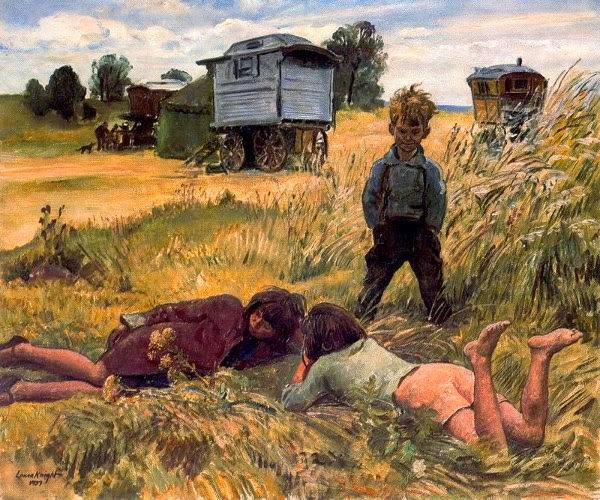
Came across a book about the New Forest in Hampshire - The Enchanted Forest by Gladys Mackenzie Forbes (Mate & Sons, Bournemouth circa 1930). It is attractively illustrated in black and white by the young artist Jacynth Parsons and is written in a sort of poetic, evocative prose that was popular at the time in nature writing. This piece is about the gypsies who had long been in the New Forest and is a somewhat romanticised view of their world. This is the New Forest of Augustus John and and Juliette de Bairacli Levy both of whom had befriended the forest dwelling gypsies.
Green-Wood Fires
Aromatic sweet scented smoke hangs in the windless air like a grey-blue curtain, and mingles itself with the autumn mist. A stream sings lazily along, and the mist changes its singing into plaintive sadness, as it also does the sharp thin music of distant children's voices. A dog's bark has a note of mystery, and all things seem far away and unreal.

Down in a sleepy sheltered hollow is a picturesque encampment of gay coloured gypsy vans, yellow, green, gold, and crimson, decorated with the brooms and rush baskets, by which the gypsies make a living, and looking like distorted giant toadstools against the glory of the woods. Each van has its own graceful plume of smoke, which gradually widens out, until it is lost in the blue grey curtain. In the centre of the ring of vans, is a large fire, made from the green-wood, gathered by the gypsy children, who are far afield after still more fuel, it is their voices which vie with the streams faint song.
Over the communal fire from crossed sticks, hangs a large black pot whose steam has the most inviting odour. Near the fire, women are busy with a culinary duties, and almost in silence the men are tending the animals, lean horses, and small sturdy donkeys, while several nondescript dogs group themselves hopefully around the simmering pot. Obviously the gypsies have only just arrived, yet already the hollow has an air of home, and is fragrant with green-wood smoke, and the good smell of savoury food. When darkness falls, the campfire will glow redly, and its smoke have an even sweeter scent. One leaves the homely hollow, and the gay caravans, reluctantly, and with a tiny pain of regret.
To very few of us, for even a short time, is it made possible to live in such a simple, sane, and happy way.
 |
| Young Gypsies by Augustus John |
